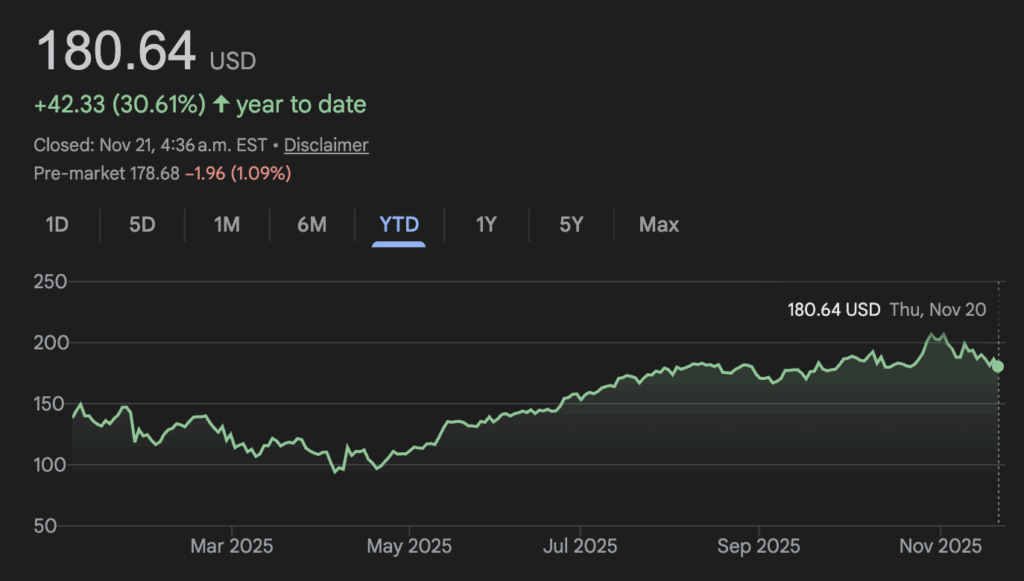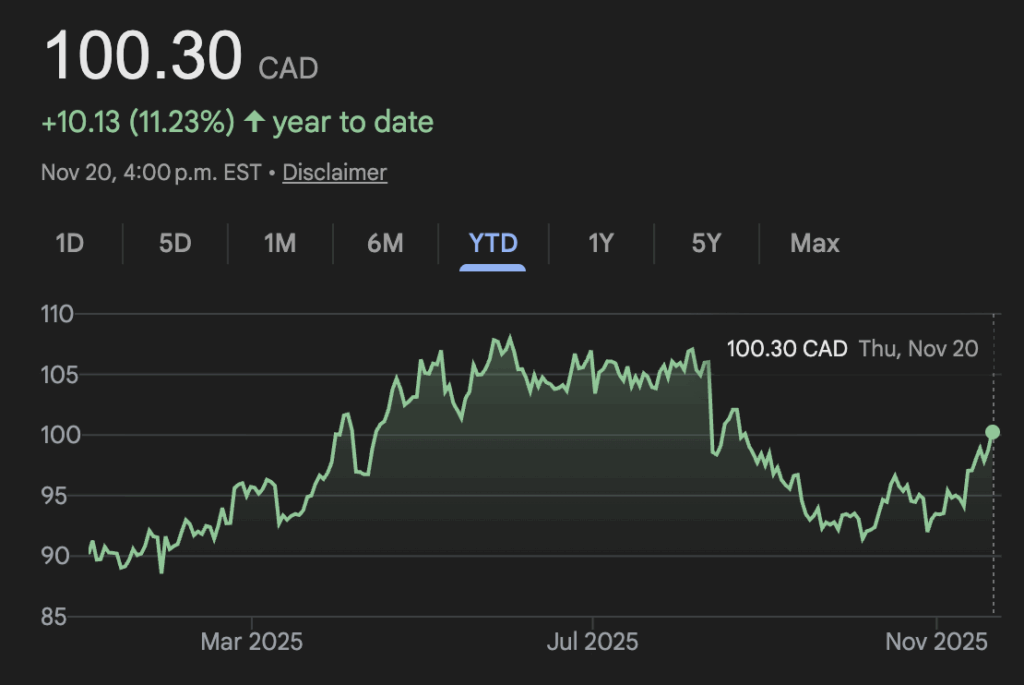News for investors: Nvidia smashes Q3 expectations as AI frenzy continues
Nvidia posts record Q3 on AI chip demand, Metro hit by frozen food issues, and Questrade rolls out new trading platform amid rising competition.
Advertisement
Nvidia posts record Q3 on AI chip demand, Metro hit by frozen food issues, and Questrade rolls out new trading platform amid rising competition.

Build your retirement savings with 1.50% interest, tax-deferred contributions and zero fees.

Earn a guaranteed 2.75% in your RRSP when you lock in for 1 year.

See our ranking of the best RRSP accounts and rates available in Canada.
MoneySense is an award-winning magazine, helping Canadians navigate money matters since 1999. Our editorial team of trained journalists works closely with leading personal finance experts in Canada. To help you find the best financial products, we compare the offerings from over 12 major institutions, including banks, credit unions and card issuers. Learn more about our advertising and trusted partners.
Numbers for its third quarter of 2025:
Nvidia’s sales of the computing chips powering the artificial intelligence craze surged beyond the lofty bar set by stock market analysts in a performance that may ease recent jitters about a Big Tech boom turning into a bust that topples the world’s most valuable company.
The results announced late Wednesday provided a pulse check on the frenzied spending on AI technology that has been fueling both the stock market and much of the overall economy since OpenAI released its ChatGPT three years ago.
Nvidia has been by far the biggest beneficiary of the run-up because its processors have become indispensable for building the AI factories that are needed to enable what’s supposed to be the most dramatic shift in technology since Apple released the iPhone in 2007. But in the past few weeks, there has been a rising tide of sentiment that the high expectations for AI may have become far too frothy, setting the stage for a jarring comedown that could be just as dramatic as the ascent that transformed Nvidia from a company worth less than $400 billion three years ago to one worth $4.5 trillion at the end of Wednesday’s trading.
Nvidia’s report for its fiscal third quarter covering the August-October period elicited a sigh of relief among those fretting about a worst-case scenario and could help reverse the recent downturn in the stock market.
“The market should belt out a heavy sigh, given the skittishness we have been experiencing,” said Sean O’Hara, president of the investment firm Pacer ETFs.
The company’s stock price gained more than 5% in Wednesday’s extended trading after the numbers came out. If the shares trade similarly Thursday, it could result in a one-day gain of about $230 billion in stockholder wealth.
Nvidia earned $31.9 billion, or $1.30 per share, a 65% increase from the same time last year, while revenue climbed 62% to $57 billion. Analysts polled by FactSet Research had forecast earnings of $1.26 per share on revenue of $54.9 billion. What’s more, the Santa Clara, California, company predicted its revenue for the current quarter covering November-January will come in at about $65 billion, nearly $3 billion above analysts’ projections, in an indication that demand for its AI chips remains feverish.
The incoming orders for Nvidia’s top-of-the-line Blackwell chip are “off the charts,” Nvidia CEO Jensen Huang said in a prepared statement that described the current market conditions as “a virtuous cycle.” In a conference call, Nvidia Chief Financial Officer Collette Kress said that by the end of next year the company will have sold about $500 billion in chips designed for AI factories within a 24-month span Kress also predicts trillions of dollars more will be spent by the end of the 2020s.
In a conference call preamble that has become like a State of the AI Market address, Huang seized the moment to push back against the skeptics who doubt his thesis that technology is at tipping point that will transform the world. “There’s been a lot of talk about an AI bubble. From our vantage point, we see something very different,” Huang insisted while celebrating “depth and breadth” of Nvidia’s growth.
The upbeat results, optimistic commentary and ensuring reaction reflects the pivotal role that Nvidia is playing in the future direction of the economy — a position that Huang has leveraged to forge close ties with President Donald Trump, even as the White House wages a trade war that has inhibited the company’s ability to sell its chips in China’s fertile market.
Trump is increasingly counting on the tech sector and the development of artificial intelligence to deliver on his economic agenda. For all of Trump’s claims that his tariffs are generating new investments, much of that foreign capital is going to data centers for AI’s computing demands or the power facilities needed to run those data centers.
“Saying this is the most important stock in the world is an understatement,” Jay Woods, chief market strategist of investment bank Freedom Capital Markets, said of Nvidia.
The boom has been a boon for more than just Nvidia, which became the first company to eclipse a market value of $5 trillion a few weeks ago, before the recent bubble worries resulted in a more than 10% decline. As OpenAI and other Big Tech powerhouses snap up Nvidia’s chips to build their AI factories and invest in other services connected to the technology, their fortunes have also been soaring. Apple, Microsoft, Google parent Alphabet Inc. and Amazon all boast market values in the $2 trillion to $4 trillion range.

Numbers for its fourth quarter of 2025:
Grocery and drugstore retailer Metro Inc. was hit by costs related to problems at its frozen food distribution centre in Toronto in the fourth quarter, with financial impacts expected to continue into the first quarter. The company said operations at the facility resumed last week after it was shut down for almost two months, but the temporary closure cost it $22.5 million in Q4 as it reported slightly lower annual profits.
Metro chief executive Eric La Flèche said the company expects the distribution centre to be essentially back to normal by the end of December. “I want to thank all our teams who continue to execute our contingency plan to supply our stores, thereby minimizing the impact on our customers,” he said in a statement on Wednesday.
Metro was forced to stop work at the Toronto frozen food distribution centre on Sept. 12 due to an issue with its refrigeration system. It resumed operations on Nov. 10. La Flèche said on the call that a mechanical issue, not one related to automation, was responsible for the problems with the refrigeration system. He added that the company is currently working with insurers to confirm the amount it will be able to recover.
“Looking forward to Q1 of 2026, we estimate that the direct costs associated with the rental of temporary chilling equipment and with the execution of our contingency plan will impact our net earnings by approximately $15 million to $20 million,” chief financial officer Nicolas Amyot said on the company’s conference call Wednesday.
In December of last year, Metro reached the final milestone in a seven-year, almost billion-dollar supply chain transformation, which added new automation technology across its warehouses in Quebec and Ontario. The completion of Metro’s supply chain revamp, which began in 2017, was marked by the opening of the final phase of its new automated fresh distribution centre in Etobicoke, Ont. It came after Metro opened an automated warehouse for frozen products also in Etobicoke in 2022. In Quebec, the company previously opened an automated fresh and frozen centre in Terrebonne and expanded its fresh produce centre in Laval.
Metro said it earned a fourth-quarter profit of $217 million, down from $219.9 million in the same quarter last year. The company behind the Metro grocery chain and Jean Coutu drugstores says its profit amounted to $1.00 per diluted share for the 12-week period ended Sept. 27, up from 98 cents per diluted share a year ago when it had more shares outstanding.
Sales for the quarter totalled $5.11 billion, up from $4.94 billion in the same quarter last year. Food same-store sales for the quarter were up 1.6%, while pharmacy same-store sales gained 4.8% with a 5.5% increase in prescription drugs and a 2.9% increase in front-store sales.
On an adjusted basis, Metro says it earned $1.13 per diluted share in its latest quarter compared with an adjusted profit of $1.02 per diluted share in the same quarter last year.

Questrade Financial Group says it’s rolling out a new trading platform called Questrade Pro, ratcheting up the competition between Canada’s largest online brokerages. Questrade also announced it’s adding features like custom indexing and portfolio rebalancing to its existing platforms, which comes a little less than a month after Wealthsimple Inc. added a wave of capabilities including custom indexing and zero-commission options.
Meanwhile, Aviso Financial Inc.-owned Qtrade Direct Investing said in late October it was moving to a commission-free trading model and eliminating quarterly administrative fees for the platform.
Rob Galaski, president of Questrade, says the company’s latest rollout is meant to set an accelerated pace for the financial services industry.
Efforts to attract investors in recent years has resulted in Wealthsimple’s assets under administration rising to $100 billion from around $5 billion in 2019, while Questrade’s assets have grown to around $85 billion from $9 billion over the same period. Questrade also secured a banking licence in early November and says it will outline its expansion plans next year, while Wealthsimple added numerous additional bank-like account features in June.
Share this article Share on Facebook Share on Twitter Share on Linkedin Share on Reddit Share on Email